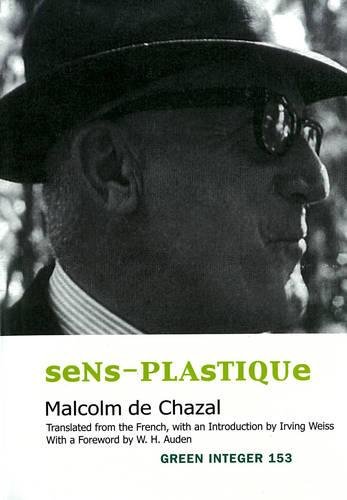
Malcolm de Chazal, Sens-Plastique, Trans. by Irving Weiss, Green Integer, 2018.
The Mauritian writer Malcolm de Chazal’s great masterwork,
Sens-Plastique, was published in France in 1948, with a preface by
Jean Paulhan, a year after its publication in Mauritius. Since that
time, the work has attained a near-legendary status and readers have
discovered in Chazal’s brilliant aphorisms what the author himself
described as a synthesizing of a “new view of life” requiring a
unique title. “I finally settled on Sens-Plastique because apart
from the fact that it seems to say that everything on earth is
sensuously connected to everything else and that we all belonged to
the same mold, ‘plastic’ suggests art in all its forms. I liked
that because I consider my whole enterprise to be more of a picture
than a book.” As W. H. Auden writes in the Foreword to the 1971
edition, “Sens-Plastique now been a companion of mine for nearly
twenty years, and so far as I am concerned, Malcolm de Chazal
(1902-1981) is much the most original and interesting French writer
to emerge since the war.” The original was first published as
Sens-Plastique (Paris: Éditions Gallimard, 1948).
In my log-rolling
between Daphnis and Chloe and Paul et Virginie, I also stepped
inadvertently onto Malcolm de Chazal. Though the author’s name had
swum into my ken a few years ago via Ramón Gómez de la Serna, the
Spanish writer whose “greguerías” were an aphoristic poetic form
much like those that the radically more sensual and imaginative de
Chazal uses in his lengthy Sens-Plastique, I’d not been aware at
the time that de Chazal was from Mauritius. The link from Paul et
Virginie, or perhaps the magic worked by this Indian Ocean island,
seems clear in de Chazal’s statement that his work is derived “from
the principle that man and nature are entirely continuous.” The
book, a world unto itself, attracted the attention of Andre Bréton,
W. H. Auden, François Ponge, Georges Bataille and a legion of other
writers. Of the more than 2,000 strikingly poetic aphorisms collected
here, a selection just of those referencing light and color (i.e.
"Blue catches cold in blue-green and sneezes in gray") were
they to be extracted and compiled together, would be of interest to
any visual artist. -
"...Sens-Plastique alone is enough to make Chazal one of the
great heretics of literature—a heretic above all because he refuses
to accept the distinction between metaphoric and literal language.
Likewise, he overrides any absolute distinction among the senses or
between the human realm and that of animals, plants, and natural
forces like wind and water: spiritual energies all."
by Barry Schwabsky

No comments:
Post a Comment
Note: Only a member of this blog may post a comment.